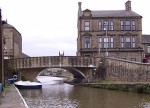Orgies in Victorian Skipton! June 5, 2010
Author: Beach Combing | in : Modern , trackback
Walter White (1811-1893) wrote about his journeys around the British Isles and Continental Europe in such classics as Holidays in Tyrol and Eastern England: from the Thames to the Humber. He was perhaps not the most exciting travel writer being rather prone to detail. But that very ability to give details or rather his inability to close out details, meant that he preserved fragments of the nineteenth century that would otherwise have been lost to us.
Beachcombing offers here one passage from White’s most readable work A Month in Yorkshire (1858). Our hero is passing through Burnsall, an inoffensive North Yorkshire village in a valley where the names of thousand-year old settlements give a sense of clean living and fresh air: Hebden, Grassington, Appletreewick…
(p.235) A man who sat reading at his door near the farther end of the village looked up as I passed, and asked, ‘Will ye have a drink o’ porter?’ Hot weather justified acceptance; he invited me to sit while he went to the barrel, and when he came forth with the foaming jug, he, too, must have a talk. But his talk was not what I expected – the simple words of a simple-minded rustic; he craved to know something, and more than was good, concerning a certain class of publications sold in Holywell Street; things long ago condemned by the moral law, and now very properly brought under the lash of the legal law by Lord Campbell. Having no mission to be a scavenger, I advised him not to meddle with pitch; but he already knew too much, and he mentioned things which help to explain the great demand for the immoral books out of the metropolis. One was, that in a small northern, innocent-looking country town, Adam and Eve balls regularly take place, open to all comers who can pay for admission.’
Now Holywell Street was a symbol of iniquity for Victorian England. A thoroughfare that ran parallel with the Strand, it was described by one Times writer as ‘the most vile street in the civilised world’. There were sold ‘prints, songbooks and other publications of the most disgusting character’, i.e. pornography. Beachcombing hardly thinks that the yokel uttered its name: Holywell Street was White’s way of raising his eyebrows to his readers. Lord Campbell’s law, meanwhile, refers to the Obscene Publications Act of 1857 and was fresh in everyone’s mind when White was writing.
But if Holywell Street and Lord Campbell are easy to decode what should be made of ‘Adam and Eve Balls’? Beachcombing has found no other reference even on Google. There is not much elucidation either under ‘Adam and Eve party’ save a trickle of disreputable sites (‘the bitch did me in my butt’ etc); sites that would have got Holywell Street burnt to the ground back in White’s day. Presumably Adam and Eve are evoked not for their innocence or for their apples but for their nudity? This makes an Adam and Eve Ball a Victorian orgy.
White unfortunately does not tell us where the nude ball took place but ‘the small northern, innocent-looking country town’ sounds like nearby Skipton. Would Burnsall’s resident pervert have known any other urban centre? This bland description is certainly not incompatible with White’s visit to Skipton a few pages previously.
Beachcoming once spent a boring teenage afternoon in Skipton. If only he had known. This would have changed everything.
He does remember though that the chips were good.
[drbeachcombing[AT]yahoo[DOT]com] for references to Adam and Eve Balls or dastardly deeds in nineteenth-century Skipton.



